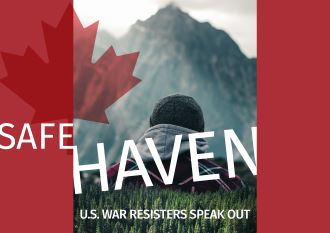
Safe Haven: U.S. War Resisters Speak Out 2020
Distributed by New Day Films, 350 North Water Street Unit 1-12, Newburgh, NY 12550; 888-367-9154
Produced by Alison Mountz
Directed by Lisa Molomot
Streaming, 80 mins
College - General Adult
Canada; Iraq War; Migration; Vietnam War
Date Entered: 05/10/2023
Reviewed by Michael Pasqualoni, Librarian for Public Communications, Syracuse University LibrariesSafe Haven personalizes experiences of military draft resisters and anti-war objectors who flee the United States for Canada. It illustrates cases of Vietnam War and Iraq War era quests by one subset of Americans we come to know quite well throughout the film, as they recount seeking refuge in the nation to the north. A strong collection of first-person testimonials is the heart and soul here, as each resister speaks at a human level about their struggles and biographies. Particularly effective are the comparisons, some unspoken, between anti-Vietnam War and anti-Iraq War postures, when government policies shift in recent times toward a more constraining reality for that type of cross-border migration. While valuable data is shared on the wars and depictions of resistance efforts are featured, such as the Canadian War Resisters Support Campaign and Iraq Veterans Against the War, the film is not an intellectual probe into anti-war philosophies or related organizational tactics or campaigns. What is well portrayed instead, are life experiences of these specific persons who have fled the U.S. for Canada. Director Molomot has previously demonstrated a talent for introducing human struggles at crossing borders in the face of steep odds in Missing in Brooks County, her film covering migrant deaths at the U.S.–Mexican border. Outcomes in Safe Haven may be less immediately deadly but no less life changing.
Themes cutting across the time periods described in Safe Haven include the variety of official lies told to citizens and societies as catalysts behind war efforts, and examples spanning generations of the resilience for those persons caught between two countries. The anti-Vietnam War resisters we see who end up serving in positions of elected or judicial office within Canada is impressive. Prison times does befall some others that we encounter in the film.
On a cinematographic level, Safe Haven may slightly overuse its confessional shooting style as we meet the resisters. That is only a rare hurdle, and perhaps a few further visualizations might have lessened what may strike some viewers as overuse of talking heads who directly address the camera. Perhaps more images associated with behaviors and surroundings of resisters deserved a tiny bit more screen time, because so much of this tale the resisters share is about behavior and not analysis. The strength of what we do learn from the resisters in these reflections results in a film about war resistance where the statements embody more or less anything except strident anti-war screeds. This itself may be a chief strength in assisting the film’s quite effective demystification of the many contradictions looming when governments turn citizens into soldiers.
Safe Haven is recommended as a valuable resource for those exploring U.S. - Canadian relations and also for students and scholars of human migration. It is a solid addition to the study of U.S. war resisters generally and of the Vietnam and Iraq War experiences of the United States more specifically. The film may be of added special interest to individuals or agencies who serve persons recovering from any number of traumatic war related experiences, military veterans and resisters alike.
Awards: Best Documentary, Central Alberta Film Festival (2020)
Published and licensed under the Creative Commons Attribution 4.0 license. Anyone can use these reviews, so long as they comply with the terms of the license.